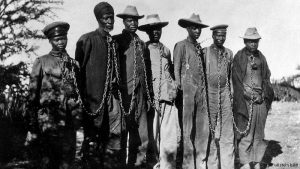Holocaust Precursor: German Colonialism in Namibia
- Posted by arendt
- Posted in bureaucracy, crimes against humanity, genocide, Germany, Hannah Arendt, Namibia, NEH Summer Scholars, racism, The Origins of Totalitarianism

Source: Deutcshe Welle
http://www.dw.com/en/germany-to-return-skulls-of-colonial-victims-in-namibia/a-18575293
A few days ago, the New York Times reported about efforts on the part of the German government to acknowledge the attempted extermination of Nama and Herero ethnic tribes in Namibia, who were resisting German domination and land grabs in Namibia in the early twentieth century. As the Times reported:
During German rule in Namibia, called South-West Africa back then, colonial officers studying eugenics developed ideas on racial purity, and their forces tried to exterminate two rebellious ethnic groups, the Herero and Nama, some of them in concentration camps.
Recognition of these atrocities would mark the documentation of the murder of tens of thousands of Africans as the first twentieth century genocide.
In The Origins of Totalitarianism, Hannah Arendt discussed the relationship between European Imperialism and racism, and its connection to the political system of totalitarian rule:
Two new devices for political organization and rule over foreign peoples were discovered during the first decades of imperialism. One was race as a principle of the body politic, and the other was bureaucracy as a principle of foreign domination…Both discoveries were actually made on the Dark Continent. (242)
African colonial possessions became the most fertile soil for the flowering of what later was to become the Nazi elite. Here they had seen with their own eyes how peoples could be converted into races and how, simply by taking the initiative in the process, one might push one;s own people into the position of the master race. (268)
Arendt acknowledged the “terrible massacres” that resulted from these policies:
the Boers’ extermination of the Hottentot tribe, the wild murdering of Carl Peters in German Southeast Africa, the decimation of the peaceful Congo population–from 20 to 40 million reduced to 8 million people (242)
Yet, she fails to call this extermination genocide, arguing that the Holocaust was an “unprecedented event” in European history. What did Arendt see in the Nazi extermination process that led her to consider it unprecedented? Was she blinded by a kind of Eurocentrism, similar to the charges levied now against the Germans for taking so long in acknowledging the massacres of thousands of Nama and Herrero in Namibia as genocide? Or is her theory of totalitarianism based on a recognition that the Nazi system appropriated in unique ways the “full range of potentialities of power accumulation and destruction” that the combination of racism and bureaucracy enabled?
These will be among questions taken up in the Arendt seminar this summer.

